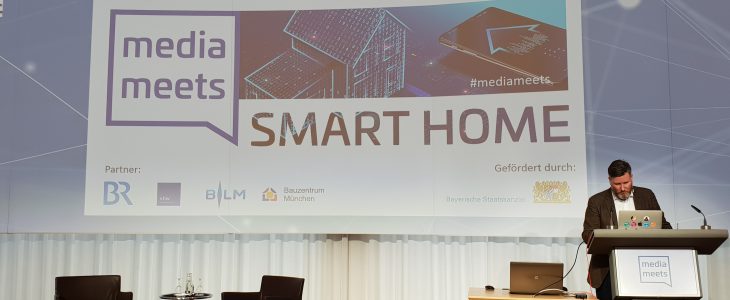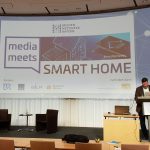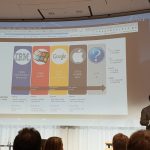
Last week I attended the very interesting event “Media meets Smart Home” event organized by the Mediennetzwerk Bayern. The event looked at the present and future of smart homes in general. Furthermore the more than a dozen different speeches focused on the consumption of media within smart homes. It was a good mix of different topics that all contributed to the big picture. My personal highlights were Christiane Varga talking about how technology is changing within our living spaces, Marco Maas talking about the sensor data he collects in his flat and Petra Friedrich talking about ambient assisted living.
Gaining Digital Sovereignty
Throughout the day it became clear, that there is a lot of talk and interest around smart home, but it has not yet found its way into our houses on a broader scale. Most people try out smart speakers for a start (e.g. Amazon Alexa or Google Home). I really liked the term “digital sovereignty”, which I had not heard before. A few speakers emphasized the importance of a modernized education system to equip adults, but especially teenagers and kids with their own digital sovereignty. I outlined in some of my previous posts, that I believe improving education is the key to improve a society. Hence, I was glad to hear, that many speakers shared a similar opinion.
Work and Living Spaces become more fluid
Christiane Varga, a trend and future researcher, explained that future research was focused purely on technology so far. However, society and with it role models change, too. She also showed, that life phases have changed a lot in the last decades. People give their life a new direction at totally different phases than in the past. For example, there is a significant number of founders at the age of 55 to 60 nowadays. In addition, society, work and living spaces become more and more fluid. Hence, the idea of the own four walls does not hold up anymore. Whereas I agree with the changing phases in life, I doubt that the idea of the own four walls will vanish. I believe people need their own place of retreat.
Shy Tech – Less dominant Technology
Another thing Christiane Varga mentioned were different smart home and technology preferences between geographies. Whereas in Asia technology at home is very obvious and dominant, people in Europe prefer technology to remain in the background and become less dominant. She called this phenomenon “Shy Tech”. In Shy Tech the usage of technology in a smart home becomes much more conscious and often integrated in regular furniture. Independent of the geography and its different tastes, media will be consumed as augmented reality (AR) and virtual reality (VR). In both technologies the ethical component remains important for every media provider. I like the following video to show a path smart home should definitely not go down.
Pee Breaking News
Marco Maas started by showing a visualization of data points collected by the more than 180 sensors in his flat. Obviously this is exaggerated for today’s standards, but he had a point when explaining, that this will be normal in a not too distant future. He focused a lot on media content provision itself. With platforms like Amazon Alexa or Google Home media provision and consumption will move more and more towards platforms. According to him, Google is defining standard formats for single topic news together with around 300 media providers from around the world. This is necessary, because media content is consumed in many different ways and formats nowadays. One example are so called “pee breaking news”. News article so short, they can be read in a pee break. Media providers will have to change the way and the format they provide content if they want to remain relevant.
Gamification for all Age Groups
Gamification was another hot topic, which is important for all age groups. For young children gamification can be used in a smart mirror to support learning how to brush teeth. One important aspect of gamification is to motivate and include a fun part. It is scientifically proven, that gamification of cognitive tasks can help to prevent dementia significantly. Petra Friedrich, who spoke about ambient assisted living, uses gamification methods in the Living Lab she set up with her team. The idea of ambient assisted living is to give elder people technical assistance so they can continue living in their own flat longer. For me, this is one of the most important purposes of smart home.






